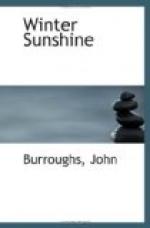Maple sugar is peculiarly an American product, the discovery of it dating back into the early history of New England. The first settlers usually caught the sap in rude troughs, and boiled it down in kettles slung to a pole by a chain, the fire being built around them. The first step in the way of improvement was to use tin pans instead of troughs, and a large stone arch in which the kettles or caldrons were set with the fire beneath them. But of late years, as the question of fuel has become a more important one, greater improvements have been made. The arch has given place to an immense stove designed for that special purpose; and the kettles to broad, shallow, sheet-iron pans, the object being to economize all the heat, and to obtain the greatest possible extent of evaporating surface.
March 15.—From the first to the middle of March the season made steady progress. There were no checks, no drawbacks. Warm, copious rains from the south and southwest, followed by days of unbroken sunshine. In the moist places—and what places are not moist at this season?—the sod buzzed like a hive. The absorption and filtration among the network of roots was an audible process.
The clod fairly sang. How the trees responded also! The silver poplars were masses of soft gray bloom, and the willows down toward the river seemed to have slipped off their old bark and on their new in a single night. The soft maples, too, when massed in the distance, their tops deeply dyed in a bright maroon color,—how fair they looked!
The 15th of the month was “one of those charmed days when the genius of God doth flow.” The wind died away by mid-forenoon, and the day settled down so softly and lovingly upon the earth, touching everything, filling everything. The sky visibly came down. You could see it among the trees and between the hills. The sun poured himself into the earth as into a cup, and the atmosphere fairly swam with warmth and light. In the afternoon I walked out over the country roads north of the city. Innumerable columns of smoke were going up all around the horizon from burning brush and weeds, fields being purified by fire. The farmers were hauling out manure; and I am free to confess, the odor of it, with its associations of the farm and the stable, of cattle and horses, was good in my nostrils. In the woods the liverleaf and arbutus had just opened doubtingly; and in the little pools great masses of frogs’ spawn, with a milky tinge, were deposited. The youth who accompanied me brought some of it home in his handkerchief, to see it hatch in a goblet.
The month came in like a lamb, and went out like a lamb, setting at naught the old adage. The white fleecy clouds lay here and there, as if at rest, on the blue sky. The fields were a perfect emerald; and the lawns, with the new gold of the first dandelions sprinkled about, were lush with grass. In the parks and groves there was a faint mist of foliage, except among the willows, where there was not only a mist, but a perfect fountain-fall of green. In the distance the river looked blue; the spring freshets at last over, the ground settled, the jocund season steps forth into April with a bright and confident look.




